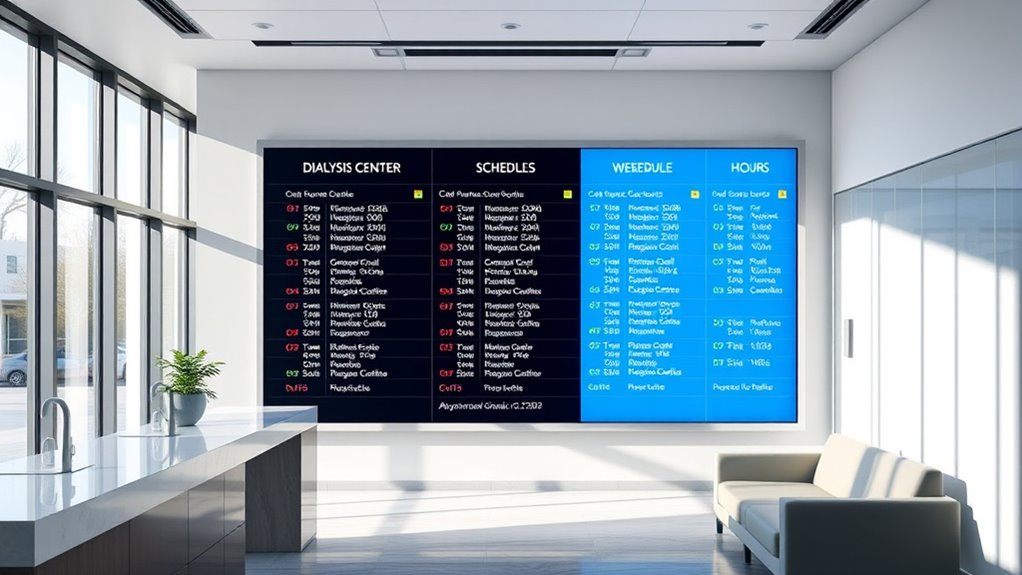Most dialysis centers offer three weekly sessions lasting 3 to 5 hours, typically during daytime hours. However, many centers now provide evening and overnight options to fit your schedule better, especially in larger cities with advanced technology. Transportation and location can affect available hours, so it’s helpful to check with your provider about flexible scheduling. To find out more about making your treatments more convenient, keep exploring the options that suit your lifestyle.
Key Takeaways
- Most centers offer three weekly treatments lasting 3-5 hours, primarily during daytime hours.
- Evening and overnight dialysis options vary by location and center, with larger cities more likely to offer extended hours.
- Transportation access, including public transit and specialized services, affects your ability to schedule treatments flexibly.
- Extended and overnight dialysis sessions provide more scheduling freedom and comfort with amenities like entertainment and water filtration.
- Modern centers utilize technology and design features to offer flexible scheduling, including automation and home dialysis options.

Are you wondering about the availability of dialysis center hours that fit your schedule? If so, you’re not alone. Many patients need to coordinate their treatments around work, family, or personal commitments. Fortunately, dialysis providers are increasingly offering flexible scheduling options to accommodate diverse needs. However, understanding how these options work involves considering factors like insurance coverage and transportation options, which can substantially influence your choices.
Most patients typically receive three hemodialysis treatments weekly, each lasting between 3 to 5 hours. While daytime sessions are common, evening dialysis shifts—those starting after 6 p.m.—aren’t universally available. Access to evening hours varies based on geographic market areas, with larger cities generally offering more evening shift options than smaller communities. This variation means you might find it easier to schedule treatments during evenings if you live in a bigger market. It’s also essential to contemplate how your insurance coverage might impact your access; some plans may have restrictions or specific providers that offer extended hours, so checking with your insurer can help you understand what’s available.
Evening dialysis options vary by location; larger cities often offer more flexible schedules.
Transportation options are another critical factor in scheduling your treatments. If your dialysis center is within easy reach via public transit, personal vehicle, or specialized medical transportation, you might have more flexibility to choose appointment times that suit your routine. Conversely, limited transportation can restrict your choices, especially for early morning or late evening shifts. Some dialysis centers offer transportation services, but availability varies. Planning ahead for reliable transportation can reduce stress and help ensure you don’t miss treatments, which are essential for your health. Transportation access can significantly influence your scheduling options and overall treatment adherence.
Extended and overnight dialysis options are gaining prominence, offering longer sessions—often 7 to 8 hours—that can occur overnight or during the day. These sessions allow you to free up daytime hours for work, family, or leisure activities. Advanced centers now provide nocturnal hemodialysis with amenities like heated, reclining, and massaging chairs, plus entertainment options such as TVs and internet access. These improvements aim to enhance comfort and convenience, making treatments less disruptive to your daily life. Water filtration technology in dialysis has also advanced, ensuring safer water quality during these extended sessions, which is crucial for patient safety and comfort.
Modern dialysis centers are also designed with patient comfort and accessibility in mind. Spacious rooms, cozy waiting areas, outdoor spaces, and user-friendly equipment help create a more positive experience. Scheduling flexibility is further improved through automation and advanced controls, enabling centers to offer more evening and overnight shifts. Additionally, if you’re undergoing home dialysis training, you might enjoy even greater flexibility outside the center.
With over 7,500 dialysis centers serving more than 500,000 patients nationwide, options are expanding, but they still depend on geographic location, insurance plans, and transportation. By understanding these factors, you can better plan your treatments and find the hours that work best for your life.
Frequently Asked Questions
Can I Schedule Weekend Dialysis Sessions?
You can often schedule weekend dialysis sessions, including Saturday appointments, depending on your center’s policies. Weekend scheduling offers flexibility for those unable to attend weekday treatments and helps avoid crowding. Be sure to check with your dialysis center, as availability may vary. Planning your treatments around weekend sessions can improve your health outcomes and provide more convenience, especially if your schedule makes weekday treatments difficult.
Are Evening Hours Available for Dialysis?
You’re wondering if evening hours are available for dialysis. Many facilities now offer appointment flexibility with evening shifts, especially in urban areas, making it easier to fit treatments into your schedule. However, transportation options can be a challenge, as not all centers have evening hours nearby. It’s important to check with your local unit to see if they provide evening appointments and consider transportation needs for better access.
How Do Holiday Hours Affect Treatment Schedules?
Holiday closures and staffing adjustments can disrupt your dialysis schedule, making it challenging to stay on track. Centers often reduce hours or close temporarily, so you might need to reschedule treatments in advance. To avoid missed sessions, stay in close contact with your care team, confirm holiday hours, and plan accordingly. Proactive communication guarantees you maintain treatment consistency and helps prevent health risks associated with missed or delayed dialysis.
Is There a Way to Get Emergency Dialysis Outside Regular Hours?
Yes, you can get emergency dialysis outside regular hours by relying on emergency preparedness plans. Many providers, like DaVita, offer 24/7 services or coordinate alternative treatments through hotlines and emergency centers. It’s wise to have a backup plan, including contacts for alternative facilities and transportation options. Home dialysis, such as peritoneal dialysis, also offers a flexible alternative, helping you avoid urgent visits and stay on treatment during emergencies.
Do Center Hours Vary by Location or Season?
When it comes to center hours, they do vary depending on your center location and seasonal changes. Urban centers often offer extended hours and more treatment options, while rural centers may have limited schedules. Seasonal changes generally don’t affect hours much, but holidays might cause adjustments. It’s always best to double-check with your dialysis center, as hours can change and you don’t want to be caught flat-footed when planning your treatments.
Conclusion
Think of your dialysis schedule as the gears of a finely tuned watch—every part needs to work in harmony. By knowing the center’s hours, you’re taking control of your health journey, making treatment days fit smoothly into your life. Don’t let unexpected surprises throw you off course. With a clear plan in place, you’ll stay on track and keep your wellness moving forward, like a well-oiled machine that never misses a beat.
Albert is the visionary leader and editor-in-chief of Hours Today List. With a keen eye for detail and a relentless commitment to accuracy, he oversees all content that goes live on our platform. His expertise in curating, editing, and ensuring the reliability of our listings is unmatched. Albert’s leadership inspires and drives the entire team towards excellence. Under his guidance, Hours Today List has grown into the trusted resource it is today.










